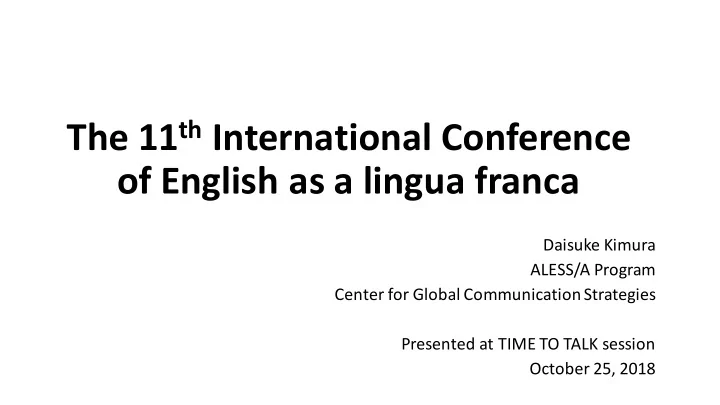

The 11 th International Conference of English as a lingua franca Daisuke Kimura ALESS/A Program Center for Global Communication Strategies Presented at TIME TO TALK session October 25, 2018
Outline • Introduction to English as a lingua franca (ELF) • Overview of the conference • My work • Highlights of the conference • Applications
What is ELF? • “any use of English among speakers of different first languages for whom English is the communicative medium of choice, and often the only option” (Seidlhofer 2011: 7) • “the use of English in a lingua franca language scenario” (Mortensen 2013: 36) • ELF is NOT a specific variety of English (cf. World Englishes)
ELF, Migration and Multilingualism
My presentations 1. English as a lingua franca, multilingualism, and social networks in a study abroad context: Narrative case studies of Japanese students in Thailand 2. ELF and additional language learning: Analysis of a Thai tutoring session
Highlights of the conference • Plenary talk by Lourdes Ortega • Pedagogical ideas
Plenary talk by Lourdes Ortega Multilingualism and ELF: A (Mostly SLA-Informed) Outsider perspective • ELF’s contributions to applied linguistics • Combatting ‘native-speakerism’ and “monolingual bias” • No territorial claims • No nativizing claims • Full linguistic legitimacy to nonnative speakers • ELF’s shortcomings • ELF research has mostly focused on affluent, educated and elite populations • Locale, race, class (positioned by these factors, multilinguals often experience discrimination and marginalization)
ELF-aware teaching “a continuous process of critical reflection, design, implementation, and evaluation of instructional activities that reflect and localize one’s interpretation of the ELF construct” (Sifakis & Bayyurt 2017: 459). “the purpose of teaching becomes the development of a capability for effective use [of English] which involves the process of exploiting whatever linguistic resources are available, no matter how formally 'defective'" (Seidlhofer 2011: 12).
Considerations for ELF-aware teaching • ELF is about diversity and fluidity, not about uniformity and fixity • We must cultivate learners’ willingness and capability to continue learning life-long and life-wide • Aligning language ideologies of learners with the reality of the world is a pressing issue (Kimura forthcoming; Konakahara, Murata, and Iino 2017) • Professional expertise overrides language background (Hynninen 2016) • Decoupling language expertise from native speaker status
Applications
Awareness raising through discussions Graduate STEM Enrollment in the US
Some more ideas • Matched guise technique as a conversation starter • https://www.dialectsarchive.com/ • Close analysis of actual language use • Task-based activities wherein language is not the sole focus • Using faculty publications as teaching materials • Class visits among the faculty
Thank you for listening! Daisuke Kimura dkimura@aless.c.u-tokyo.ac.jp Please share your ideas about how to teach in “ELF-aware” ways! Also, come to the symposium on January 30, 2018! (Co-hosted by CGCS, GFD, and The Japan Association of National Universities)
Recommend
More recommend